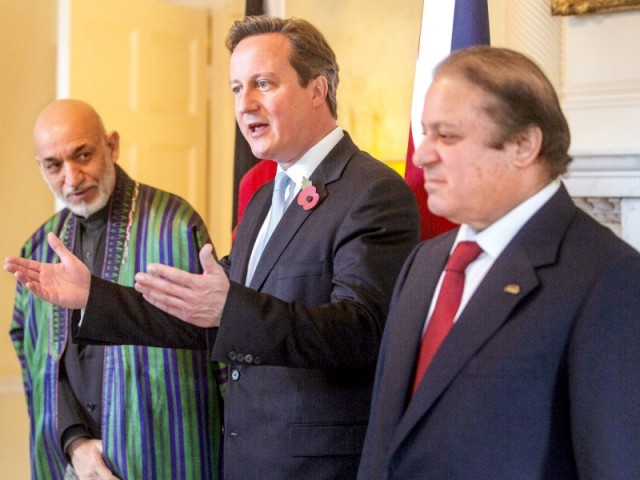

Afghan President Hamid Karzai has mere months in office left and is yesterday’s man, with tomorrow’s man an election away. Prime Minister Nawaz Sharif, meanwhile, appears to be making up foreign policy as he goes along. He has his own preoccupations with terrorism, with many of the problems attendant upon internal violence having deep roots in Afghanistan. He assured the British and Afghan leaders that his government would not support any particular group in Afghanistan post to 2014, doubtless speaking with an eye and ear to the east as Indian flanking moves have effectively neutered the never-robust doctrine of strategic depth. His words will be taken with a large pinch of salt by many, not least the Americans who have thrown a considerable spanner in the works. As the summit concluded a report was published in The New York Times that said the Americans had caught the Afghans in an attempt to gain traction with Pakistan by forming an alliance with the outlawed TTP. President Karzai is said to be ‘fuming’ at the American intervention. As things stand, peace in Afghanistan is the least likely outcome of the imminent drawdown and all the players know that.
Published in The Express Tribune, October 31st, 2013.
Like Opinion & Editorial on Facebook, follow @ETOpEd on Twitter to receive all updates on all our daily pieces.
COMMENTS (3)
Comments are moderated and generally will be posted if they are on-topic and not abusive.
For more information, please see our Comments FAQ












@Feroz says: "Pakistan is caught between a rock and a hard place, thanks to the dual policies it has opportunistically pursued"
On the contrary Pakistan is playing a waiting game, it does not need to jump the gun now. It can talk peace, release a prisoner here or there to enable talks. Very good chance that Talibans will try to exert control in the post American uncertainities. Actually Afghanistan is handed on a silver platter to Pakistan once Amercians leave. India is a fringe player, russians and chinese will leverage the wealth, which Taliban and Pakistan will allow post troop withdrawal. Indian contribution will be marginalized.
Strategically Pakistanis believe violence will come down with US troop wihtdrawal. Drone attacks will be stopped. So Pakistan will come out winner with less violence at home and a friend in afghanistan.
Pakistan will also have at it's disposal trouble makers who could keep the Indian Army busy. In all these there is also a distinct possibility that these trouble makers can get emboldened and go after Pakistani establishment.
If the Afghan imbroglio is not sorted out at the earliest, both Afghanistan and Pakistan could find themselves in dire straits. The Taliban should be persuaded to join the political mainstream and test their popularity at the polls. Trying to use their guns to take over Power will be strongly resisted by not only many Afghans but also neighbors from the region --- Russia, China, Iran and India. Pakistan is caught between a rock and a hard place, thanks to the dual policies it has opportunistically pursued. If it backs the Taliban it will be in trouble, if it abandons the Taliban it will still be in trouble. A lose lose situation either way for Pakistan unless it mends its relations with neighbors and neutralizes the impact.
"peace in Afghanistan is the least likely outcome of the imminent drawdown and all the players know that."
After the U.S.-led coalition departs, why should the remaining "players" seek peace? Karzai thrives on corruption and war is both a useful distraction from his misdoings and provides opportunities for more graft. The Talibans seek to rule through such conflict and maybe Karzai will give them the keys, once he's drained his wealth into overseas bank accounts. Pakistan's leadership still chases dreams of "strategic depth" and the opportunity to push miscreants out of Pakistan into another country. The Iranians and Russians will intervene as they see fit to combat drug smugglers.
And the "ordinary" Afghans or Pakistanis? They are made to feel powerless to change matters through peaceful means. If they don't blame their leaders they will fall victim to the blandishments of those who tell them the "root cause" of their problems lie in the West: either way terrorism will expand its base in Afghanistan once more.
The coming failure was dictated years ago, when the U.S. and Pakistan failed to agree upon common strategic goals for their Afghan policies. Rather than establish and enforce a strong democracy, corruption was permitted to thrive in exchange for opportunities to attack terrorists training and sheltering in Pakistan until the U.S. departs. With Osama bin Laden gone, the terrorists' international reach much reduced, and the U.S. unwilling to spend treasure and lives to remain Karzai's and Pakistan's whipping boy, why shouldn't the U.S. depart as soon as possible?
After what happened to the Taliban in 2001 and Saddam in 2003, who thinks the U.S. can't return to destroy its enemies should the need arise once more?